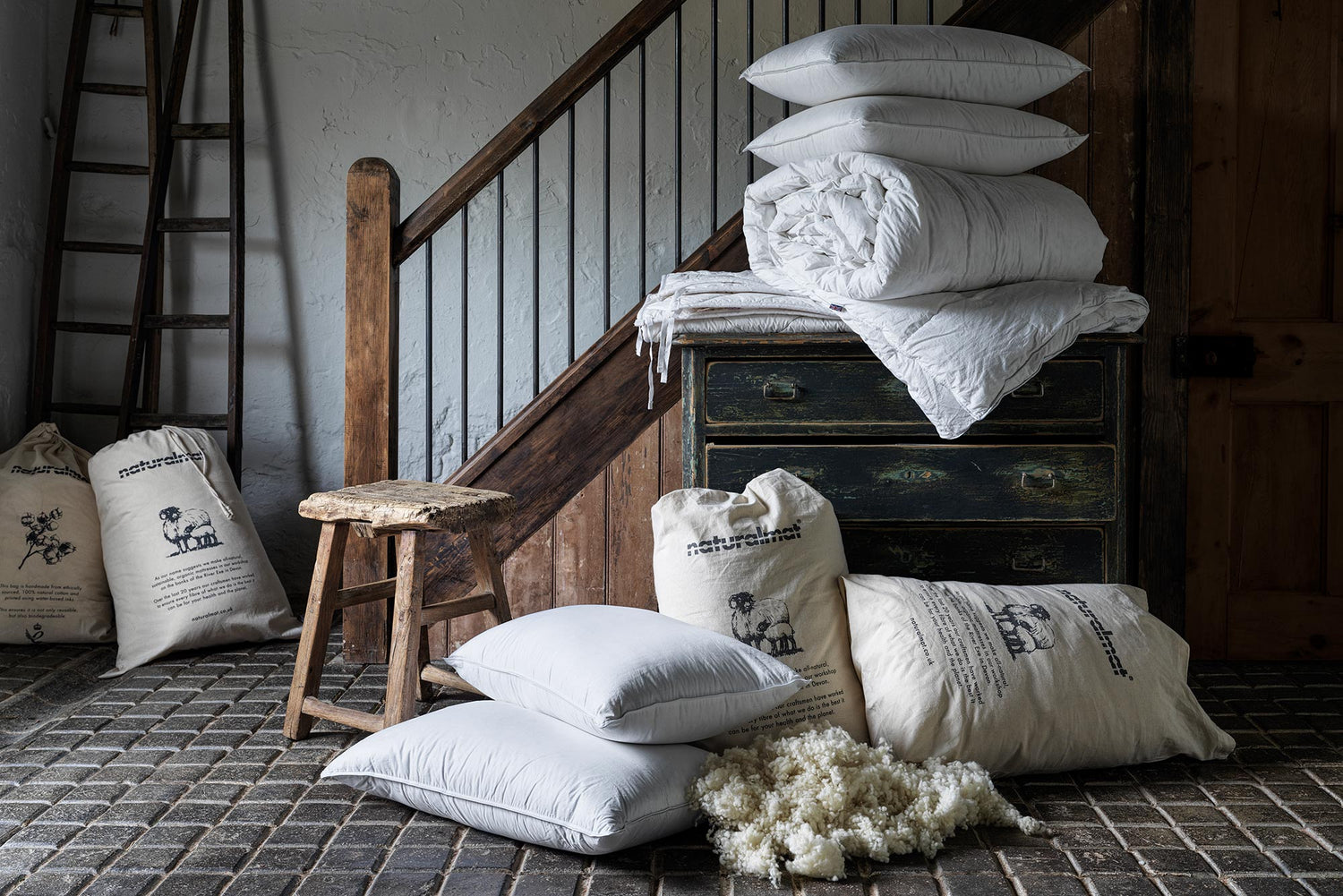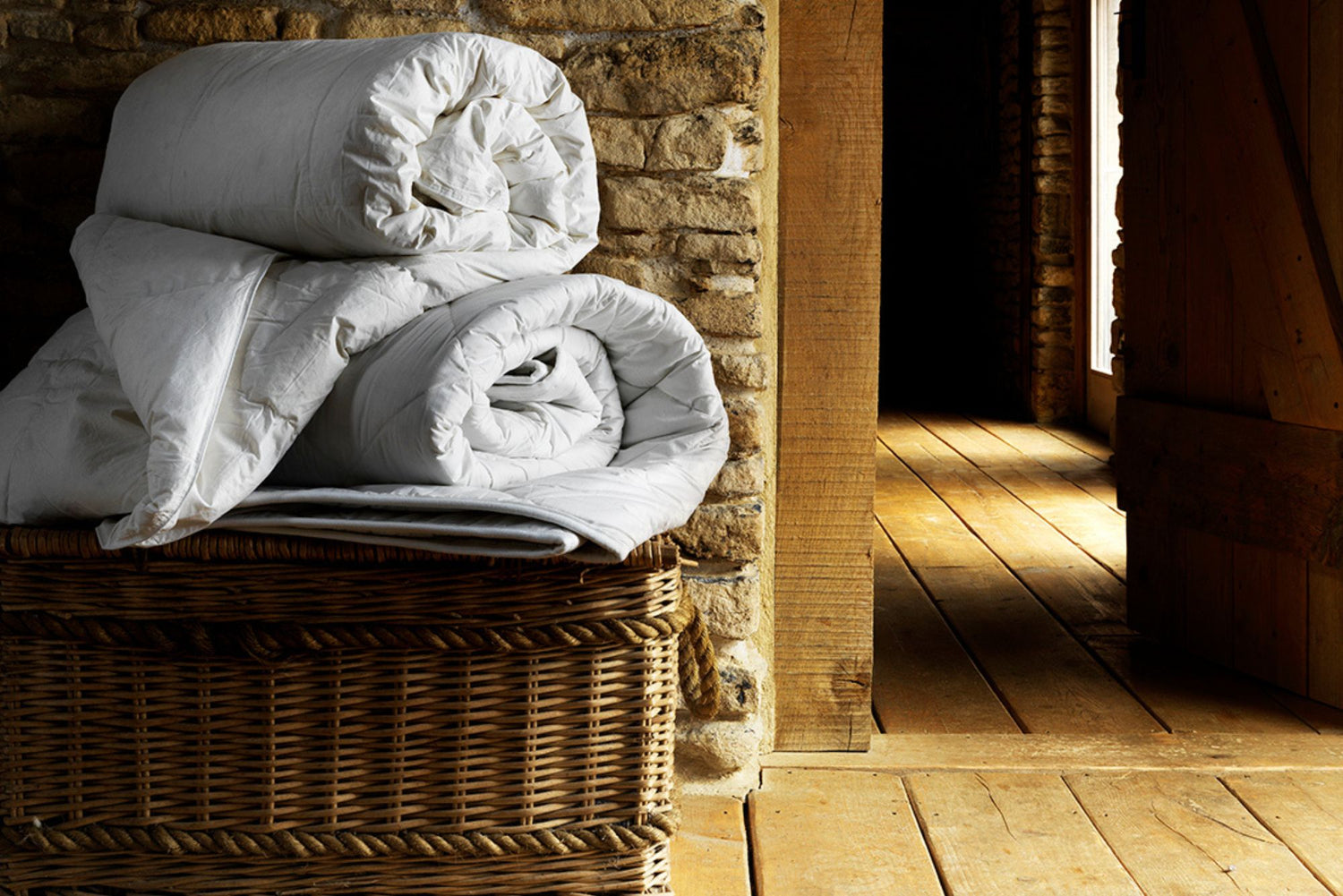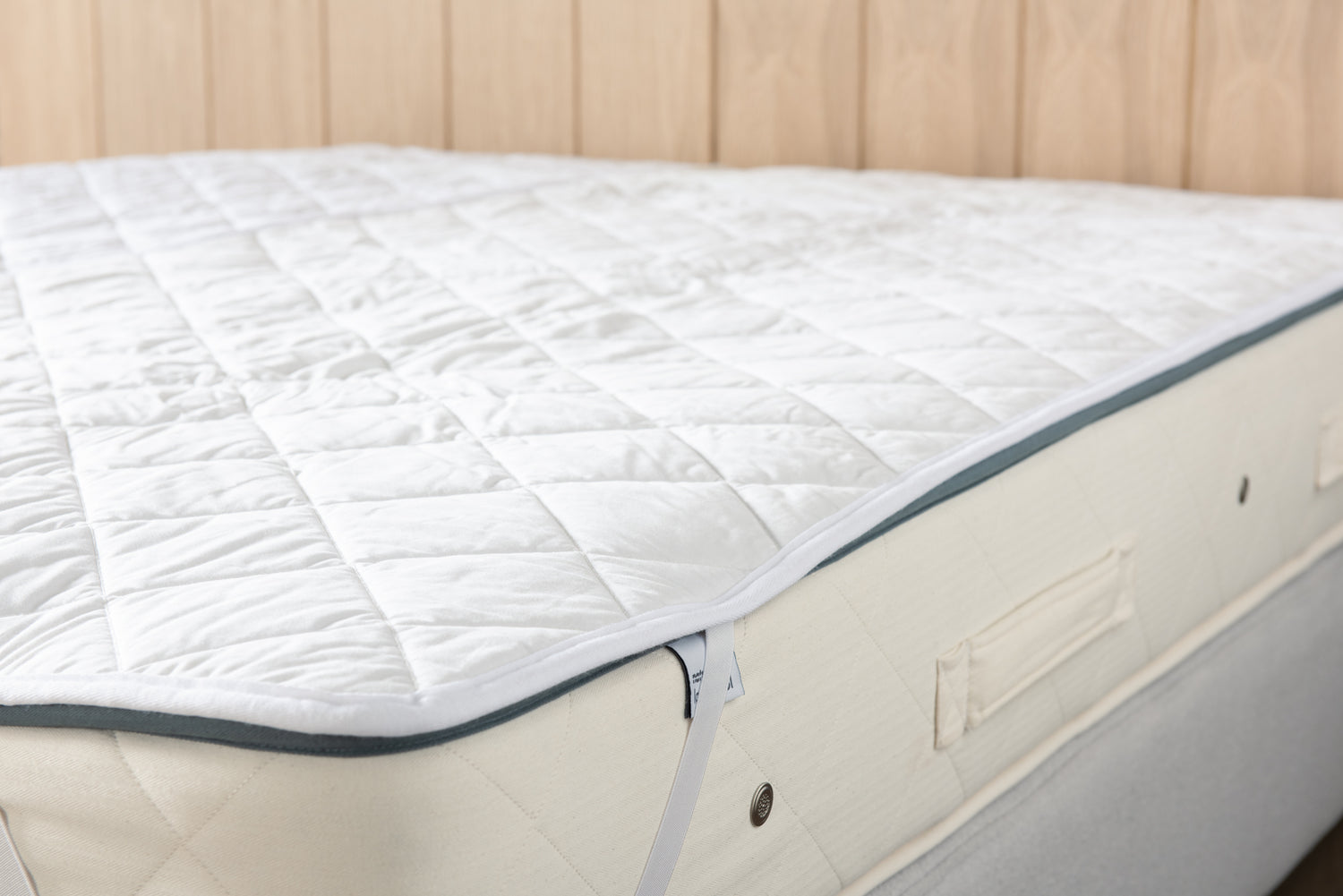How to clean your natural pillows, duvets & mattress protectors

Good To Know.
We recommend washing your bedding (pillows, duvets and protectors) every 2-4 months.
Follow the steps below to ensure they stay in the best possible condition.

Natural Fibre Pillow Cleaning Guide
We recommend plumping your pillows every morning to prevent the natural fibres inside from settling.
From our Duck Down Surround Pillow to our sumptuous, luxuriant Goose Down Pillow and even our Organic Wool Pillow, all of our natural fibre pillows are machine washable at 40°C.
We recommend using your machine’s ‘delicates’ or ‘gentle’ cycle, and using an environmentally-friendly detergent such as Ecover. Once washed, we recommend that all of our natural fibre pillows are air or tumble dried at a very low temperature. It’s important your pillow is completely dry before reuse. Do not dry clean.
Natural Fibre Duvet Cleaning Guide
We offer a range of natural fibre duvets which require specific care and cleaning.

Organic Wool Duvets
Starting off with our most popular bedding item - our Organic Wool Duvet. Our wool duvets are carefully made from locally-sourced, certified organic wool - and should therefore be treated with equal care when they get home.
Due to the careful design and organic filling of our wool duvets, we do not recommend cleaning them in a washing machine. To keep your wool duvet in top condition, we suggest that you have them professionally dry cleaned at an eco-friendly dry cleaner that uses non-toxic detergents, such as Johnsons (nationwide) or BLANC (London) - see ‘ Eco-Friendly Dry Cleaners’ below for details.
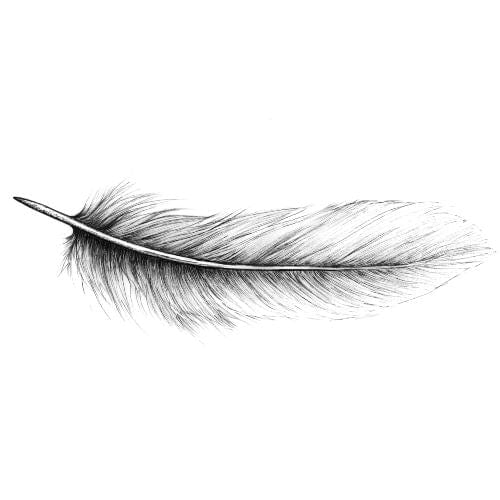
Natural Feather & Down Duvets
As with all of our organic wool duvets, we strongly recommend that our Goose Down Duvets and Duck Feather Duvets are dry cleaned at an eco dry cleaner as Johnsons (nationwide) or BLANC (London) that uses non-toxic detergents for best results and longevity. However, if absolutely necessary, our Goose Down and Duck Feather Duvets can be machine washed.
For optimal results we recommend washing your natural feather duvet at 40°C on a gentle cycle. However, in the interest of sustainability they can also be washed at a lower temperature of 30°C, saving energy. We recommend using an environmentally friendly detergent such as Ecover.
After washing, our it's important to dry your natural feather duvet. We recommend tumble drying on low heat or leaving your duvets to air dry on a line.
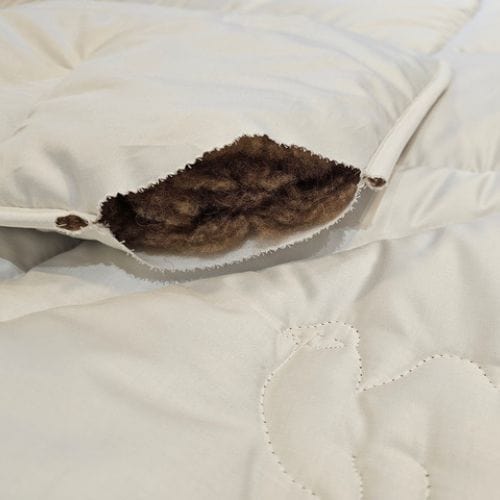
Natural Camel Hair Duvet
Our most luxurious duvet yet, filled with soft and lightweight Mongolian camel hair encased in 100% cotton sateen cover.
The Camel Hair Duvet requires gentle care and can be only be dry cleaned.
Traditional Topper Cleaning Guide
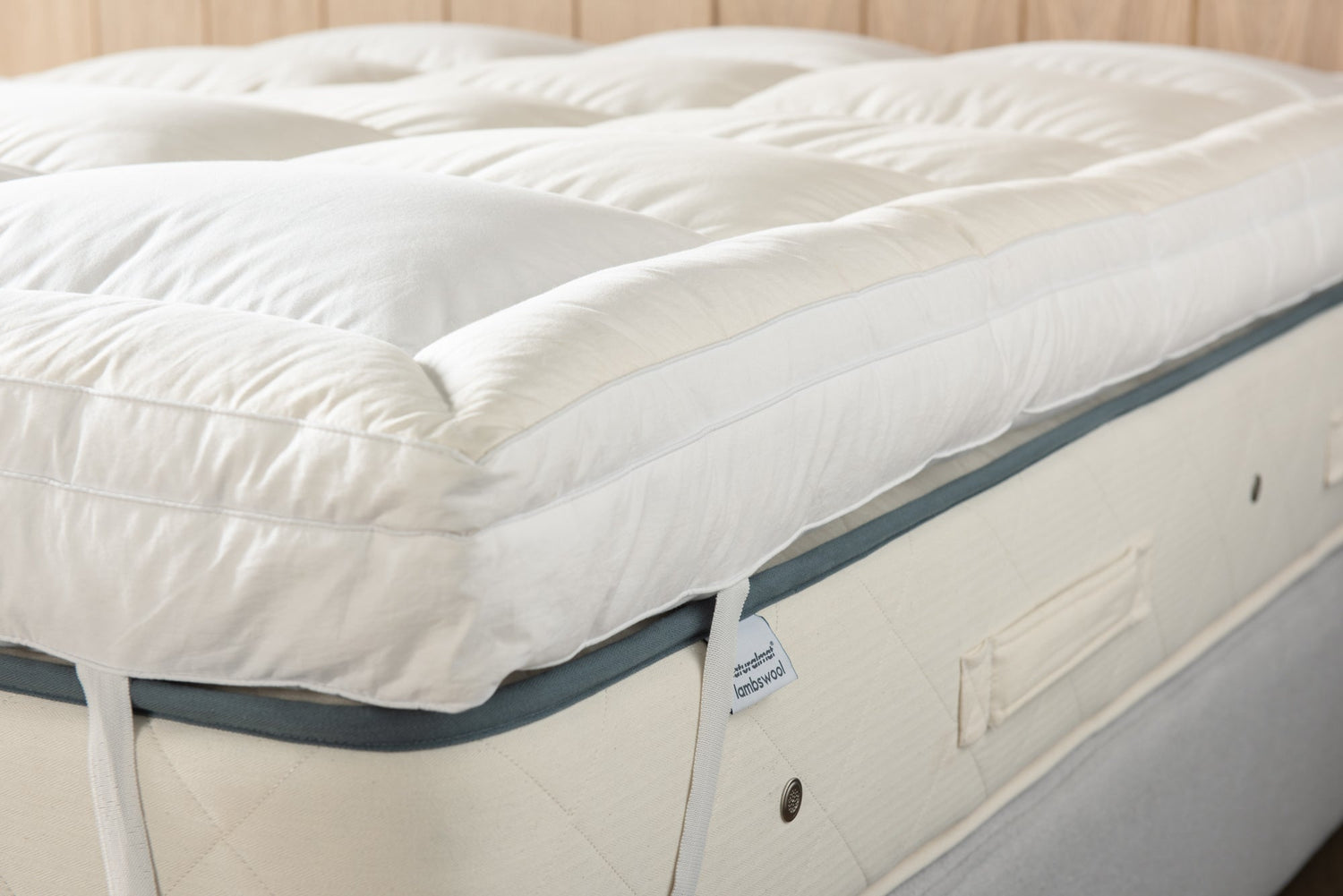
Caring for your feather and down Traditional Mattress Topper will ensure it remains comfortable, clean, and long-lasting.
Cleaning
Our Traditional Topper is spot clean only. We recommend using a mild detergent diluted in warm water. Pat don't rub the soiled area until clean.
Dry the topper immediately and thoroughly using a hair dryer. Do not leave wet or damp. Do not dry clean
Maintenance
Regularly fluff your feather and down mattress topper to maintain its loft and even distribution of filling. Alternate rotating and flipping the mattress topper every 1-2 months to prevent uneven compression and wear.
Natural Mattress & Pillow Protectors Cleaning Guide
It's important to care for your mattress and pillow protectors as well. They have the hard job of keeping your mattress and pillow clean, and should be washed regularly. We recommend washing your protectors at least every other month.
Washable Wool Mattress Protector
- Machine wash on cold or up to 30ºc on a gentle cycle
- Leave to air dry on a line
- Do no dry clean

Washable Cotton Mattress Protector
- Machine wash up to 60ºc
- To save energy, was at 30ºc
- Do not bleach
- Leave to air dry on a line
- Dry clean with any solvent other than Trichloroethylene
Organic Waterproof Mattress Protector
- Wash at 60ºc on a gentle cycle
- Tumble dry on a low heat or leave to air dry on a line
- Do not dry clean

Organic Cotton Jersey Pillow Protectors
- Machine wash at 40º
- Do not bleach
- Medium iron
- Do not dry clean
- Do not tumble dry
Our Natural Bedding
Our Natural Bedding
Eco-Friendly Dry Cleaners
Many associate dry cleaning with nasty chemicals - however, in recent years there has been a switch to dry cleaners using more sustainable methods, offering the same professional quality without the use of harmful chemicals.
GreenEarth is a dry cleaning company who, like Naturalmat, has been pioneering sustainability in its industry for over 20 years. Instead of using Perchloroethylene (a hazardous, carcinogenic pollutant which is the most common solvent used for dry cleaning in the US), the GreenEarth dry cleaning solution is based on silicone, an environmentally non-toxic, non-hazardous and extremely gentle alternative to petrochemicals.

GreenEarth cleaning methods use low amounts of water and energy to produce odourless, hypoallergenic results while ensuring the best possible results for both fabrics and the environment.
We recommend finding your local GreenEarth cleaner online via their store locator. With over 350 dry cleaners across the UK using GreenEarth techniques, it’s easy to care for your duvet in an environmentally-friendly way.
Looking for something else?
View all our Care Guides below to learn how to clean and care for other products.





